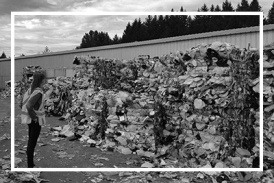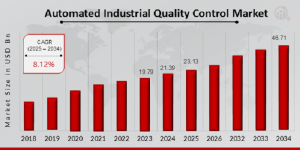Automated Industrial Quality Control Market Size is Projected to Grow Expeditiously: to Reach USD 46.71 Billion by 2034
AI-powered Automated Industrial Quality Control revolutionizes manufacturing with real-time monitoring, predictive analytics
The Automated Industrial Quality Control market is a rapidly growing sector in the industrial automation industry, driven by the increasing demand for efficiency, precision, and consistency in manufacturing processes. The rise of Industry 4.0, coupled with advancements in AI, machine learning, and robotics, has played a significant role in the development of automated quality control systems. These systems utilize advanced sensors, cameras, and software to monitor production lines, identify defects, and ensure that products meet the desired quality standards. This automation helps manufacturers minimize human error, reduce operational costs, and improve the overall production speed, leading to higher levels of productivity. The adoption of automated quality control systems is particularly significant in industries such as automotive, pharmaceuticals, electronics, food and beverage, and consumer goods, where high product quality is crucial for consumer safety and brand reputation.
Download Sample Pages: https://www.marketresearchfuture.com/sample_request/27349
Market Segmentation
The Automated Industrial Quality Control market can be segmented based on type, application, and region. In terms of type, the market is categorized into vision systems, X-ray systems, laser sensors, and others. Vision systems, which use cameras and image processing techniques, hold a dominant share in the market due to their ability to perform high-speed, high-accuracy inspections. X-ray systems are increasingly being used in industries like pharmaceuticals and food processing to ensure product safety. Laser sensors are widely used for detecting surface defects in materials. On the basis of application, the market is segmented into automotive, pharmaceuticals, electronics, food and beverage, and other manufacturing sectors. The automotive sector leads the market, as quality control in automotive manufacturing requires precision and efficiency, which automated systems can provide. Geographically, the market is divided into North America, Europe, Asia-Pacific, Latin America, and the Middle East & Africa. North America and Europe are mature markets for automated industrial quality control, with extensive industrial infrastructure and high investment in automation technologies. However, Asia-Pacific is expected to witness the highest growth during the forecast period, driven by the rapid industrialization in countries like China, India, and Japan.
Market Key Players
The Automated Industrial Quality Control market is highly competitive, with several key players leading the charge in providing innovative solutions. Some of the prominent players in the market include:
• Omron Corporation
• Rockwell Automation
• Carl Zeiss
• Hexagon
• Baumer
• SICK
• Teledyne Technologies
• Cognex
• Yokogawa Electric
• Microscan Systems
• Schneider Electric
• Mitsubishi Electric
• Keyence
• Emerson
• Endress+Hauser
Browse In-depth Market Research Reports Automated Industrial Quality Control Market: https://www.marketresearchfuture.com/reports/automated-industrial-quality-control-market-27349
Market Opportunities
The Automated Industrial Quality Control market is poised to benefit from several key opportunities. One of the major drivers of growth is the increased adoption of artificial intelligence (AI) and machine learning technologies. AI can enhance the capabilities of automated quality control systems by allowing them to learn from historical data, make real-time decisions, and improve accuracy over time. Additionally, the integration of Internet of Things (IoT) devices in manufacturing processes presents an opportunity for real-time monitoring and analysis, which can lead to improved decision-making and predictive maintenance. The rise of small and medium-sized enterprises (SMEs) adopting automation technologies presents another opportunity for market expansion. As automation becomes more accessible, SMEs can reduce their operational costs and improve their product quality without large upfront investments. Moreover, the increasing need for sustainability and environmental compliance in manufacturing presents a chance for quality control systems to support these objectives by ensuring the production of environmentally friendly products.
Restraints and Challenges
Despite the promising growth prospects, the Automated Industrial Quality Control market faces certain challenges that may hinder its progress. One of the primary obstacles is the high initial cost associated with implementing automated quality control systems. Small and medium-sized manufacturers may find it difficult to justify the upfront investment required for the adoption of these technologies, especially if they have limited resources. Another challenge is the complexity of integrating automated systems with existing manufacturing processes. Many industrial facilities still rely on legacy systems, and retrofitting them to work with newer automation technologies can be a daunting task. Additionally, there is a shortage of skilled labor with expertise in AI, machine learning, and automation technologies, which may impede the effective implementation of these systems. There is also the risk of cyber threats, as the increased reliance on digital systems in industrial settings opens up vulnerabilities to hacking and data breaches.
Procure Complete Research Report Now: https://www.marketresearchfuture.com/checkout?currency=one_user-USD&report_id=27349
Regional Analysis
The global Automated Industrial Quality Control market exhibits regional variations in terms of growth and adoption rates. North America and Europe are the leading markets due to their well-established industrial bases and early adoption of automation technologies. In North America, countries like the United States and Canada have robust manufacturing sectors, particularly in automotive, pharmaceuticals, and electronics, driving the demand for automated quality control systems. Europe, with its advanced manufacturing infrastructure, is also a major hub for automation technologies. The Asia-Pacific region, however, is expected to witness the fastest growth during the forecast period. Countries like China, Japan, and India are experiencing rapid industrialization and increasing investments in automation technologies. The growing emphasis on smart manufacturing and the expansion of industries like automotive, consumer goods, and electronics in this region are expected to drive demand for automated quality control systems.
Recent Developments
In recent years, there have been several notable developments in the Automated Industrial Quality Control market. For example, companies are increasingly focusing on integrating AI and machine learning into their quality control systems to improve decision-making and enhance efficiency. In 2024, Cognex Corporation introduced a new vision system that uses deep learning algorithms to detect defects with a higher degree of accuracy, marking a significant advancement in automated quality control. Additionally, there is a growing trend of adopting cloud-based solutions for real-time monitoring and data analysis. This enables manufacturers to monitor production quality remotely and make adjustments as needed, improving operational efficiency. Furthermore, partnerships and collaborations between automation technology providers and manufacturing companies have been on the rise, allowing for the development of tailored solutions to meet specific industry needs.
Related Reports
Music App Market:
https://www.marketresearchfuture.com/reports/music-app-market-42911
Narcotics Scanner Market:
https://www.marketresearchfuture.com/reports/narcotics-scanner-market-42837
Next Generation Transistor Market:
https://www.marketresearchfuture.com/reports/next-generation-transistor-market-42893
Office And Contact Center Headset Market:
https://www.marketresearchfuture.com/reports/office-contact-center-headset-market-42856
Road Safety Market:
https://www.marketresearchfuture.com/reports/road-safety-market-42903
Protection Tax Helps Clients Resolve Unfiled Returns Before IRS Action Escalates
leagend T31 Sets New Standard for Affordable and Accurate OBD II Diagnostics
Couple Opens Unique '432Hz' Live Music Sanctuary on Spain's Costa del Sol for Summer Vibes and Son Awareness
Kalendarium
Więcej ważnych informacji
 Jedynka Newserii
Jedynka Newserii

 Jedynka Newserii
Jedynka Newserii

Handel

Ze względu na różnice w cenach surowce wtórne przegrywają z pierwotnymi. To powoduje problemy branży recyklingowej
Rozporządzenie PPWR stawia ambitne cele w zakresie wykorzystania recyklatów w poszczególnych rodzajach opakowań. To będzie oznaczało wzrost popytu na materiały wtórne pochodzące z recyklingu. Obecnie problemy branży recyklingu mogą spowodować, że popyt będzie zaspokajany głównie przez import. Dziś do dobrowolnego wykorzystania recyklatów nie zachęcają przede wszystkim ceny – surowiec pierwotny można kupić taniej niż ten z recyklingu.
Przemysł spożywczy
Rośnie presja konkurencyjna na unijne rolnictwo. Bez rekompensat sytuacja rolników może się pogarszać

Rolnictwo i żywność, w tym rybołówstwo, są sektorami strategicznymi dla UE. System rolno-spożywczy, oparty na jednolitym rynku europejskim, wytwarza ponad 900 mld euro wartości dodanej. Jego konkurencyjność stoi jednak przed wieloma wyzwaniami – to przede wszystkim eksport z Ukrainy i niedługo także z krajów Mercosur, a także presja związana z oczekiwaniami konsumentów i Zielonym Ładem. Bez rekompensat rolnikom może być trudno tym wyzwaniom sprostać.
Transport
Infrastruktury ładowania elektryków przybywa w szybkim tempie. Inwestorzy jednak napotykają szereg barier

Liczba punktów ładowania samochodów elektrycznych wynosi dziś ok. 10 tys., a tempo wzrostu wynosi ok. 50 proc. r/r. Dynamika ta przez wiele miesięcy była wyższa niż wyniki samego rynku samochodów elektrycznych, na które w poprzednim roku wpływało zawieszenie rządowych dopłat do zakupu elektryka. Pierwszy kwartał br. zamknął się 22-proc. wzrostem liczby rejestracji w ujęciu rocznym, ale kwiecień przyniósł już wyraźne odbicie – o 100 proc.
Partner serwisu
Szkolenia

Akademia Newserii
Akademia Newserii to projekt, w ramach którego najlepsi polscy dziennikarze biznesowi, giełdowi oraz lifestylowi, a także szkoleniowcy z wieloletnim doświadczeniem dzielą się swoją wiedzą nt. pracy z mediami.









.gif)

 |
| |
| |
|